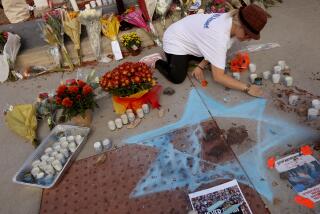In Egypt, young and tech-savvy Islamists try to project new image
Bearded and feeling misunderstood, Mohamed Tolba made a movie to tell the world he is not a terrorist.
“Where’s My Ear?” is a satire on the colliding passions and deep suspicions between liberals and ultraconservative Muslims like him, known as Salafis, who have become a pronounced political voice in the new Egypt. The short film has gotten more than 80,000 hits on YouTube and has made Tolba a celebrity and a curiosity among the Koran set.
The plot is simple: A liberal invites a Salafi to his home in a comedy of errors and misperceptions. The liberal offers tea but the Salafi, whose beliefs forbid alcohol, suspects it’s spiked with vodka. The Salafi, convinced that the liberal is scheming to have him arrested, searches the living room for hidden surveillance cameras.
The playful yet earnest clip is the work of a group of young Salafis who are keeping their traditional beards and religious piety but are showing a hip, socially conscious facet to soften the brimstone of their clerics.
It is a perplexing terrain. Tolba has received angry text messages accusing him of betraying Islam while he has also endured wary glances and whispered asides from secularists.
Before President Hosni Mubarak was toppled in February, “it was not safe for a bearded guy to walk in the street, ride a bus or eat in a restaurant,” Tolba said. “The media blamed Salafis for terrorist attacks. We became isolated, a whole separate world. But when Mubarak went away, this bubble collapsed.”
Ultraconservatives and more moderate Muslim Brotherhood followers are vibrant forces in a political Islam that is indigenous yet often splintered and undefined after decades of suppression. The extremist elements of this revival, with their calls for banning bikinis at tourist resorts, abolishing banks, breaking Egypt’s peace treaty with Israel and establishing an Islamic caliphate, have rattled liberals and fed Western misgivings.
The potency of sectarianism has sharpened since Mubarak’s fall. It grew more disturbing this week when at least 20 Christian Copts were killed in clashes with soldiers and thugs during a protest over the burning of a church in southern Egypt. The violence, which included Muslim men attacking Christians with stones and sticks, revealed the simmering religious passions that can easily be manipulated by Islamic fundamentalists.
Religion’s pull on political life in Egypt will affect Islamist movements in other nations seized by revolution and change, such as Tunisia, Yemen and Libya. Flowing through the discourse are questions on modernism, democracy and how young generations with lives drenched in Western technologies and images will merge Islam with the political aspirations of the so-called Arab Spring.
Tolba, a heavyset telecom sales manager with rimless glasses, wants to calm the clamor as his increasingly divided country bickers over a new constitution.
“Yes, we want Islamic influence in the constitution, but we want fair laws without intimidation,” said Tolba, 32. “If people decide that sharia will not rule, we will accept that.”
He has a wry sense of humor and mischievous wit. Many Egyptians, he said, suffer from “Salaphobia: They don’t think we smile or joke.”
Tolba and other young ultraconservatives founded Salafyo Costa, named for the Western-style cafe they frequent. The movement is similar to efforts by secular activists to break with the established order and create a progressive generation of political and religious leaders.
“We’re trying something brand-new,” said Tolba, who studied at the American University in Cairo and speaks flawless English. “The stereotype is that the Salafi belongs to the lower classes and has a poor education. That doesn’t represent the way we in Costa’s Salafis look, behave or look at the future.”
But Salafis have been at the center of disturbing scenes, including the deadly May burning of a Coptic Christian church in Cairo and a recent protest in which tens of thousands of Salafis demanded a strict Islamic state. Public statements by Salafi elders bristle with cultural and religious intolerance and fears that liberals want to turn Egypt into Sodom and Gomorrah.
Unlike the Muslim Brotherhood, the Salafis, literalists in following the Koran, have no rigid organizational structure. Their belief that Islam must permeate all segments of life makes them less adept at political compromise even though they can turn hundreds of thousands out to vote. Tolba is trying to improve this image.
“The masses have found themselves a bit lost” since the revolution, Tolba said. “The spirit of Tahrir Square is fading away.... Our main goal is unity. Nobody is working to bring liberals and Islamists together. We stand in the middle and push politics aside.”
One of Salafyo Costa’s coming-out parties, so to speak, was a small but symbolic gesture.
“Who are the people who hate Salafis the most? The Christians,” he said. “We called for a football match with a Christian team. We wanted to play on church grounds, but the church was scared and suspicious. We found a private field. Surprisingly, we were scared, and they were scared because they thought they were playing with monsters.”
The soccer game ended in a tie.
Bassem Victor, a Christian, said the Salafis followed sharia law teachings on modesty by playing in shorts that stretched below their knees. “There will always be those ideological differences,” Victor said, “but that doesn’t mean that we can’t enjoy coexisting and focusing on what we can do together.”
Tolba’s group also organized Salafi and Christian doctors to provide care in a poor Cairo neighborhood. Educated Salafis, who gravitate toward information technology jobs, got the word out, and Christians, who control a large part of the pharmaceutical industry, provided low-cost medication.
“We are like Nokia: We’re connecting people,” said Waleed Moustafa, a member of Salafyo Costa who starred in “Where’s My Ear?” Moustafa is using Facebook and the Internet to spread the group’s branches to Sudan and Saudi Arabia. “The Salafis are the nearest thing to the soul of God.”
Many ultraconservatives believe Tolba and Moustafa’s slick all-inclusive message is an affront to Salafi principles. Much of this resistance stems from political naivete and the fact, according to Tolba, that Salafis would benefit from a course in public relations.
“The big Salafi scholars want to break the ice but they don’t know how to,” Tolba said. “The resistance we’re getting is coming from younger Salafis. They don’t know how to escape the isolation the old regime kept them in. They don’t think breakthroughs come in soccer matches but in speeches and conferences.”
Arriving at their namesake coffee shop on a recent night, Tolba and Moustafa, fresh from hours of praying at the mosque, sat near huge windows overlooking the city. They were at ease; waiters weren’t staring (too much) and there wasn’t a policeman in sight. They spoke of this strange new Egypt and how, quite unexpectedly, they became Salafis.
“One of my friends died in a car accident in 2000,” Tolba said. “I was not a practicing Muslim and I started to search for God. By 2002, I found that the Salafi ideology fit my needs. It was pure and spiritual and I needed that enlightenment badly. For the first time, I started to sleep in peace.”
This purity led him to tolerance. He says he would accept a Coptic or a woman president — near impossibilities given the country’s demographics and Islamic nature — and that Egypt must end discrimination. “Where’s My Ear?” was his attempt to play the messenger and keep alive the revolution.
The title is a play on words that is at once clever and unnerving. It suggests that Egyptians of different religious sects must listen to one another. But it is also an allusion to an incident in southern Egypt in which Islamists cut the ear off of a Christian man accused of renting an apartment to promiscuous Muslim women. The film represents the hope of acceptance and the darker edges of sectarianism.
“We have to open up and listen,” Tolba said.
This struck him in July when he and Moustafa pitched a tent for 10 days and joined liberals in a sit-in against the ruling military council in Tahrir Square. Many Salafis urged Tolba not to take part in a protest called by secularists. He told them the sit-in was for a better Egypt. But he quickly realized that though the demonstrators had passion, they lacked direction.
“They didn’t know exactly what they were demanding,” he said. “They didn’t know how to map out objectives. I brought a white board and a Magic Marker and I told them, ‘You guys are going to take your first interpersonal lesson from a Salafi.’”
They laughed and he did too.
Amro Hassan of The Times’ Cairo bureau contributed to this report.
More to Read
Start your day right
Sign up for Essential California for news, features and recommendations from the L.A. Times and beyond in your inbox six days a week.
You may occasionally receive promotional content from the Los Angeles Times.







